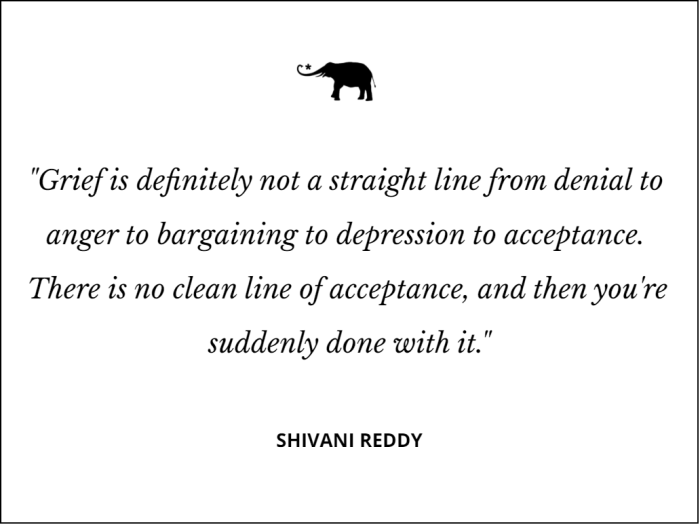
“Traces of you
Linger like a tear drop
Fresh upon the air (my heart sings for you)
Play me like a rain cloud
Sounds upon the air”
~ “Traces of You” by Anoushka Shankar and Norah Jones
When I heard this song performed live at London’s Southbank Centre, the artist explained she was halfway through writing it when her own father had passed away, and so, the lyrics took on a whole new meaning. And that night, she was also dedicating the song to all of those we had lost in India in the brutal second wave of the pandemic.
My heart, still in a million pieces, swelled and collapsed again as I closed my eyes and thought of my dad who left this world all too suddenly on March 1, 2021. At the same time, I felt a deep ache in resonance with the other friends and family we had lost, and the devastation and suffering in India. I choked back tears as the sitar strings reverberated throughout the concert hall, but with it, I felt my grief being witnessed and that I was witnessing the grief of so many others back home.
So what does it mean to witness another’s grief?
In this grief-illiterate society that we live in, where death is considered taboo and no one wants to talk about it, and, let’s face it, most people feel really awkward about what to say or do when someone they know loses a loved one, how can we truly show up for those we care about?
And when we ourselves have suffered loss, how can we show up for ourselves and attend to our own grief? How can we start to deal with the void in our life and grieve fully so that eventually we grieve with more love than pain?
There is one certainty in this life—one day you are going to die.
Your death rate and the death rate of every single living being around you is 100 percent—fact. Speaking from my own experience of losing one of the most important people in my life, I can tell you this much: grief is messy, isolating, and lonely.
In fact, I reflected to my grief counsellor that I didn’t feel at all isolated in 2020 when the pandemic hit, but I have never felt that way until after my father’s death. He was my rock, my mentor, my safe place. Losing this primal relationship turned my world upside down. It felt like an earthquake had hit and devastated everything I’ve ever known.
Contrary to what you may think, the grief never goes away, and it doesn’t get smaller, but we grow and wrap ourselves around it, embracing it as part of our new identity. The truth is that your grief is yours and yours alone. It is a grief that only you understand because your relationship with the person who is gone was and is completely different from anyone else’s.
I learned the hard way that when you’re in someone else’s grief and carrying the weight of their grief, it means your own grief goes unattended. At one point, I had sharp pains in my chest and my heart physically hurt—the only thing that got me through it was doing a 10-minute breathing meditation on the hour, every hour.
One year on, I’m still trying to find my centre. Grief has no timeline. The only thing we can do is to allow ourselves to grieve and heal on our own terms. Healing gifts us the opportunity to reset, to reconstruct, rebalance, and realign.
For me, connecting with nature has been a really powerful healing tool. I recently experienced this one Sunday morning when sitting out on the terrace of my apartment in Goa. Surrounded by lush coconut palms and sapota trees, the monkeys had come out to play and were merrily leaping from palm to palm. A mother was cradling her baby protectively on a nearby tree, while one of the more adventurous ones scuttled right past me onto the adjacent roof, where they sat munching on a piece of sapota. We looked at each other curiously but respected each other’s space.
In the distance, eagles and kites were circling and swooping majestically over the treetops. Completely immersed in this perfect dance and harmony of living beings, I felt my dad’s presence all around me. Tears of pure bliss streamed down my face as I connected with this energy, this consciousness.
Whilst not every moment of healing is quite as beautiful as this, it’s true that the person you loved remains within your heart and soul. And you can stay connected to them for the rest of your life, carrying them with you. And it may even be unconscious at first, but somewhere on a much deeper level, the connection is strong enough to surface.
In July 2021, I took a course on Bhakti Yoga which is all about the path an individual takes to lovingly devote themselves to God so they can achieve oneness with him. I came across it in the usual way—it popped up on one of my social media feeds alongside many other ads, but for some reason I felt strongly drawn to it and was compelled to sign up.
My dad was a devout Hindu who could read and speak Sanskrit and he would regularly do prayers and rituals at home and in others’ homes, and read the Bhagavad Gita daily. So whilst I was accustomed to the rituals, it wasn’t until I started studying that I fully understood why my Dad did all these things, and I instantly felt closer to him.
It wasn’t until six months later, when preparing for my father’s shradhanjali (memorial event) in our hometown in India that I discovered that his favourite chapter in the Gita was Chapter 12—which is all about Bhakti Yoga.
Rituals where others can pay their respects and bear witness are a big part of the grieving process in Hinduism.
A week before the memorial event, I travelled along with my mother, uncle, aunts, and a close family friend to Varanasi (also known as Kashi or Banaras) to immerse my dad’s ashes in the river, Ganges. We left our hotel around 6:30 a.m. on a misty Sunday morning, and en route, there was the obligatory almost-breakdown of our auto-rickshaw. The last part of the journey involved traipsing through a myriad of back alleys to reach the banks of the Ganga, and I couldn’t help but laugh to myself when I knew for a fact my dad would be saying, “Why are you bringing me to this dirty place?!”
Traditionally, it would always be a male who would perform these kinds of rituals, but thankfully, the priest was open-minded enough to allow me to do the ceremony. He stressed that not everyone who wants to go to Kashi makes it there, and the fact that we had travelled so far was testament to the fact that we had been guided and we were meant to be there. After concluding the prayers for both my dad and our ancestors, we boated out into the river, and it was there that I laid his ashes to rest in the water—back to nature, back to the Source, or as one friend described it, accompanying his transition to his “new life” as pure consciousness—one with God.
And it was only when I reflected on it in that way that I too found some stillness and peace.
It’s also become apparent to me that we only seem to experience true, unconditional love for someone once they have gone.
Why is that? Is it that we let our egos get the better of us and so we quibble over the small things that person says or does, or is it that we are constantly living in a state of resistance and are never really fully in the now, in the “is-ness” of the present moment? Or maybe it’s a bit of both.
Without fail, whenever I would go home to visit my parents, my dad and I would spend an inordinate amount of time arguing over the thermostat settings for the house…and now I wonder why we spent so much energy on such a trivial thing.
Grief is definitely not a straight line from denial to anger to bargaining to depression to acceptance.
There is no clean line of acceptance, and then you’re suddenly done with it. It keeps coming back over and over again in different ways, and you have to accept it all over again.
When I found out that my company was making me redundant, I knew that the one person I wanted to talk to about it was my dad—for his steadiness and counsel. And so with the gut-wrenching realisation that I couldn’t have that conversation with him came another acceptance that I would have to find a different way to ground myself and work through it.
One of the ways in which I’ve been able to both release my sadness and witness my own grief is through breathwork, and in particular, breathwork for heart opening. This has been such an important way for me to allow myself to naturally let my emotions surface, to observe and honour my grief, and to slowly stitch back together my heart which felt like it broke into a million pieces.
And when it comes to witnessing another person’s grief, I have to say as a society, we’re extremely grief-phobic, and so we all tend to be pretty bad at this.
Some people avoid you completely because they don’t know what to say.
Others try to distract you with mundane anecdotes as if your mind could ever be diverted away from this huge loss.
And some even believe they are offering you words of comfort when they say, “You have to be strong now” when all you want to do is fall apart. Please know that you have every right to do so.
So what can you do to really support someone you care about when they are grieving?
1. Do keep checking in on them regularly. Whether it’s a call or a message, please don’t say to them “reach out when you’re ready” because that time will likely never come.
2. Do ask them what they need (and keep asking). The reality is that it’s often difficult to articulate what we need when we’re grieving, but with time, it becomes clearer.
3. Do hold space for them. And by that, I don’t mean offering advice or counselling but quite the opposite. In fact, one friend simply said to me, “You are grieving,” and with that I felt held. Another friend wrote in a message “I am just here.” Or just sit with them; there’s no need for words. Hug them, hold their hand, and know that this contact speaks volumes.
4. Do help in practical ways if you can. Taking the load off by cooking meals, running errands, helping with legal stuff can be extremely beneficial.
5. Do realise that the person will be deeply changed and may not be interested to get back to things they would normally do either immediately or ever. Their whole perspective on life will have shifted, and that’s completely natural.
I know that I am forever changed after losing my dad, and I couldn’t be the same person if I tried. And in this process of resetting and realignment, I am creating a new identity. To truly be in the flow of life, the question is who am I now that my father is gone and what legacies of his do I want to keep alive?
My story is still continuing…
When we grieve, we expand not only our bandwidth for pain but also our bandwidth for joy. I now look at life differently and know that I don’t want to postpone things that can be experienced now. Because ultimately, there is only now, this moment.
And I know there’s a natural tendency to fear that if we don’t think about our loved one for a day, we’ll forget them, or even worse, we feel guilty that we’re not thinking about them in the first place. But know truly that what determines your loyalty to your loved one is your level of love, not your level of pain. And so, I continue to integrate the grief into my life—accepting the pain as nothing more than the unexpressed love for my father.
I am my father’s daughter, and I will endeavour to continue his legacy of joy, compassion, unending service to his family, the community and far beyond to others in need.
I will keep my heart open, continue his legacy of love, and be present in this moment, right here, right now. And I hope to die empty, knowing that I have lived fully, pursued my passions and purpose, and given everything to this life that I could.
~












Read 2 comments and reply